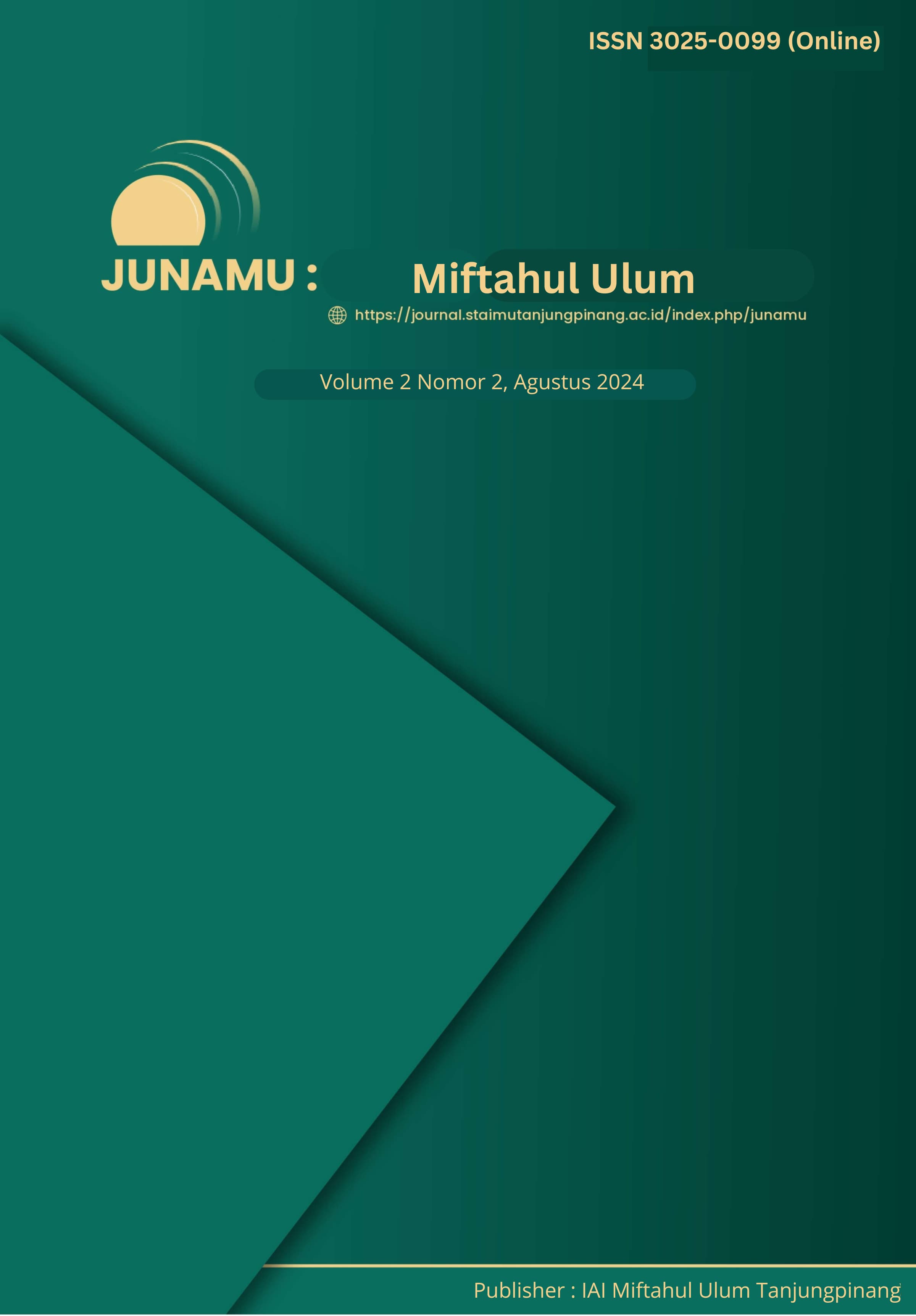Pengaruh Kompetensi Profesional Guru Fiqih Terhadap Hasil Belajar Siswa di MAN Tanjungpinang
DOI:
https://doi.org/10.64405/jm.v2i2.87Abstract
The professionalism of Islamic religious education teachers, particularly in Fiqh subjects, demands higher standards compared to other educators. However, several issues indicating a lack of professional competence have been identified. These issues include teachers not using lesson plans (RPP), students' lack of understanding of the material, delays in completing assignments, teachers' lack of discipline in adhering to the teaching schedule, many students not meeting the minimum competency criteria (KKM), teachers' inability to effectively organize the classroom, and insufficient mastery of teaching methods. The aims of this study were (1) to determine the Professional Competence of Fiqh Teachers at MAN Tanjungpinang. (2) To find out Student Learning Outcomes at MAN Tanjungpinang. (3) To determine the Effect of Fiqh Teacher Professional Competence on Student Learning Outcomes at MAN Tanjungpinang. This research method is a quantitative research, the research subject is a fiqh teacher and the sample is Madrasah Aliyah Tanjungpinang students. Data collection techniques by observing, questionnaires, interviews and documentation. The results showed that the teacher's professional competence was in the good category. This is evident from the results of the questionnaire data reaching 80% which is in the range of 61% - 80% in the Good category. While student learning outcomes reached 72%. This is evident from the results of the questionnaire data which is in the range of 61% - 80% in the Good category. The Effect of Fiqh Teacher Professional Competence on Learning Outcomes at Tanjungpinang MAN, the calculation results obtained rxy = 0.546 in the range of 0.40 ? 0.70 in the moderate or sufficient category. Thus, rxy = 0.546 is greater than r table at a significance level of 5% and a significance level of 1% (0.2542<0.3301<0.546) this means that Ha is accepted and Ho is rejected. So the results of the correlation analysis show that there is an influence of the Professional Competence of Fiqh Teachers on Student Learning Outcomes at MAN Tanjungpinang.
Keywords: Teacher Professional Competence; Fiqh; Learning Outcomes
References
Arikunto, Suharsimi. 1994. Dasar-dasar Evaluasi Pendidikan. Jakarta: Rineka Cipta. Bandung: Alfabeta. Bumi Aksara.
Beddu, S. 2019. “Implementasi Pembelajaran Higher Order Thinking Skills (HOTS) Terhadap Hasil Belajar Peserta Didik” Jurnal Pemikiran dan Pengembangan Pembelajaran. Vol. 1, No. 3.
Gafur, Abdul. 2018. “Peningkatan Hasil Belajar IPA Terpadu Melalui Metode Demonstrasi Pada Siswa Kelas VIII SMP Negeri 2 Sano Ngguang Manggarai Barat” Jurnal Ilmu Sosial dan Pendidikan, Vol. 2, No. 1.
Herawati, Tuti, 2010. “Pengelolaan Pembelajaran Praktek Akuntansi Menggunakan Model Kontektual Untuk Meningkatkan Kompetensi Siswa Pada Mata Pelajaran Akuntansi Di Kelas XI IPS 1 SMA Negeri 7 Bogor”. Jurnal Ilmiah Econosains. Vol. 8, No. 2.
Kustawan, D. 2013. Analisis Hasil Belajar, Program Perbaikan dan Pengayaan Peserta Didik Berkebutuhan Khusus. Jakarta: PT. Luxima Metro Media.
Mudlofir, Ali. 2013. Pendidikan Profesional, Jakarta: PT Raja Grafindo Persada.
Nurfuandi. 2012. Profesionalisme Guru, Purwokerto: Stain press.
Nurmawati, 2015. Evaluasi Pendidikan Islami, Bandung: Citapustaka Media.
Priyatno, Duwi. 2010. Paham Analisa Statistik Data Dengan SPSS, Yogyakarta: MediaKom.
Purwanto. 2016. Evaluasi Hasil Belajar, Yogyakarta: pustaka pelajar.
Rahmatih, A.H. et al. 2020. “Hubungan Motivasi dan Kemandirian Belajar Mahasiswa Calon Guru Sekolah Dasar”. Jurnal Wahana Sekolah Dasar, Vol.28, No 2 :76 – 83.
S, Margono. 2004. Meodologi Penelitian Pendidikan, Jakarta: Rineka Cipta.
Sinambela, Poltak, Lijan, 2017. “Profesional Dosen Dan Kualitas Pendidikan Tinggi” Jurnal Populis. Vol. 2, No. 4.
Sugiyono. 2010. Metode Penelitian Kuantitatif, Kualitatif dan R&D.Bandung: Alfabeta.
Suprihatiningrum, Jamil. 2014. Guru Profesional Pedoman Kinerja,Kualifikasi, & Kompetensi Guru, Yogjakarta: Ar – Ruzz Media.
Sutrisno, Hadi. 1987. Metodologi Research, Yogyakarta: Andi Offict
Triyono, 2015. “Profil Kinerja Guru Pendidikan Jasmani SD Negeri (Penilaian Teman Sejawat Dan Siswa Terhadap Kompetensi Pedagogik Guru Penjas SD Di UPT Purworejo, Banyuurip, Dan Kutoarjo)”. Jurnal Pendidikan. Vol. 16, No. 1.
Undang-Undang Republik Indonesia Nomor 14 Tahun 2005. 2011. Tentang Guru dan Dosen, Jakarta: Sinar Grafika.
Undang–Undang Sistem Pendidikan Nasional. 2003. Undang–Undang Republik Indonesia Nomor 20 Tahun 2003 Tentang Sistem Pendidikan Nasional, Jakarta: Kemdikbud.
Uzer Usman Moh. 2011. Menjadi Guru Profesional, Bandung:Remaja Rosdakarya.
Yusuf, M. 2014. Metode Penelitian Kuantitatif, Kualitatif dan Gabungan. Jakarta: Prenadamedia Grup.












